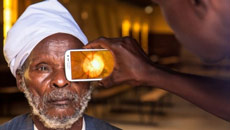Your brain knows for sure who attracts more eyeballs in your own circle as a new research has found how our brains recognise popular people.
People track popularity largely through the brain region involved in anticipating rewards.
For the study, researchers recruited people from student organisations to come into the lab and rate how much they like each other.
The researchers then used those ratings to mathematically determine who is the most liked in each social network.
They identified two critical systems in the brains of individuals who viewed popular faces. These systems are involved in emotional evaluation and reward and the system involved in our ability to think about the feelings and intentions of others.
"We find that activity in these two networks scales up with the popularity of another individual," said Kevin Ochsner from Columbia University.
They also found that the more popular someone is within a group, the more strongly these brain systems react to the sight of another popular person.
This finding suggests that popular people are "exquisitely sensitive to how likeable other individuals are and that they can then tailor their behaviour appropriately", Ochsner said.
"Knowing who is popular or likeable is critically important in times of need or distress, when you seek an alliance, or need help - whether physical or political - etc," Ochsner commented.
Another study has found that the very same brain regions involved in how we see other people's popularity also shape how well we communicate messages to others.





